West Coast great Dean Cox has been inducted into the Australian football Hall of Fame
St Kilda was circiling for Hall of Fame inductee Dean Cox early in his career. The generational ruckman reveals why he remained at the Eagles despite those offers and the turning point that led to his meteoric rise.
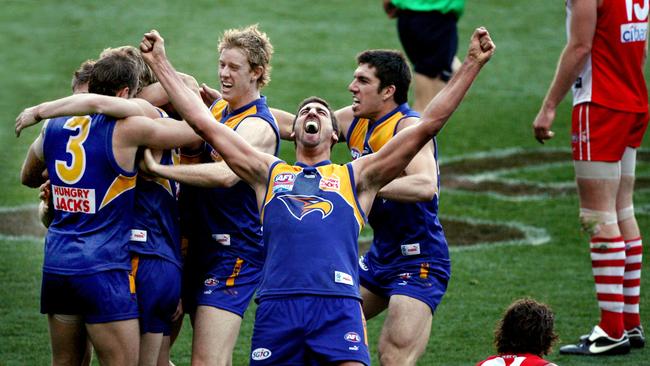
West Coast
Don't miss out on the headlines from West Coast. Followed categories will be added to My News.
The passage of play that encapsulated Dean Cox’s greatness would end in sickening failure destined for highlights-reel rotation.
In another world it might have been his crowning moment, but football’s gods seldom play by the rules.
You remember it as the Leo Barry moment, as Cox’s long kick to a heaving pack was plucked from the sky by the Sydney defender, shaking down the thunder to win the 2005 Grand Final.
But break down Cox’s particular brand of artistry in that play and it tells you everything about why he was unquestionably modern footy’s best ruckman, and now an Australian Football Hall of Famer.
The remarkable athleticism honed chasing Drew Banfield and Ben Cousins to get to one more contest as the clock ticked past 32 minutes in the final quarter.
The god-given football nous to nudge out Darren Jolly at exactly the perfect moment and take another game-changing mark.
The sublime skills built in childhood sessions with brother Jason as he turned onto his left foot, a feat unheard of for most 203cm ruckmen across history.
And the game sense to pick the most dangerous spot in the forward line for his soaring Eagles teammates.
Get your footy fix on KAYO ahead of live matches returning soon. Watch classic battles from the 60s to today, docos, news and more. New to Kayo? Get your 14-day free trial & start streaming instantly >
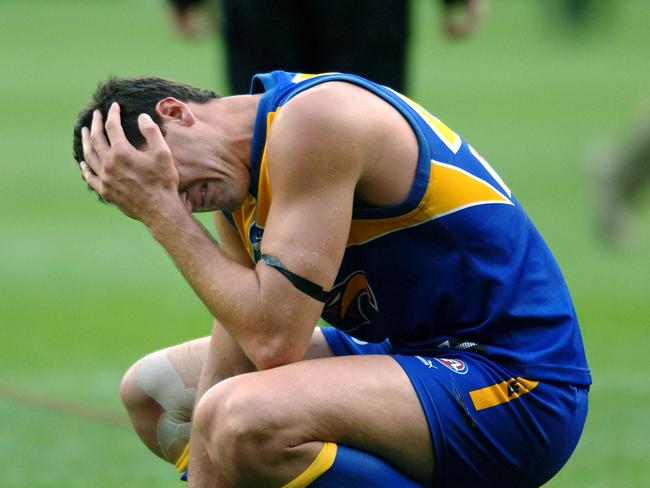
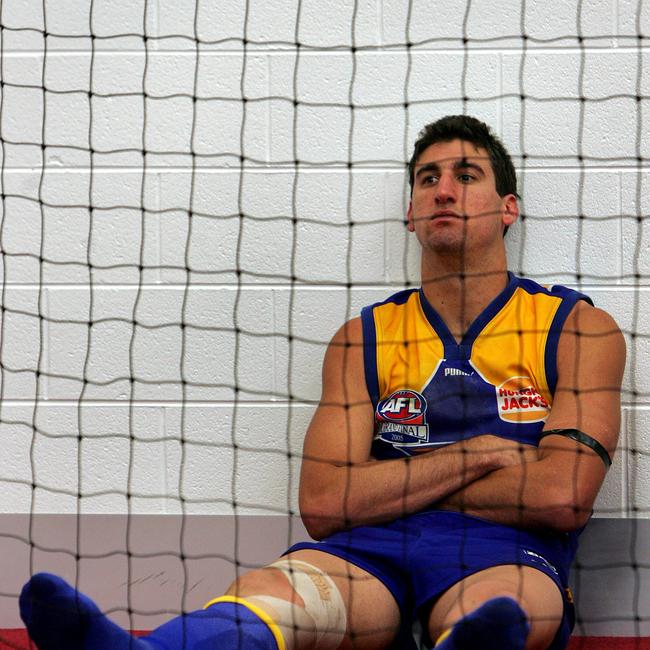
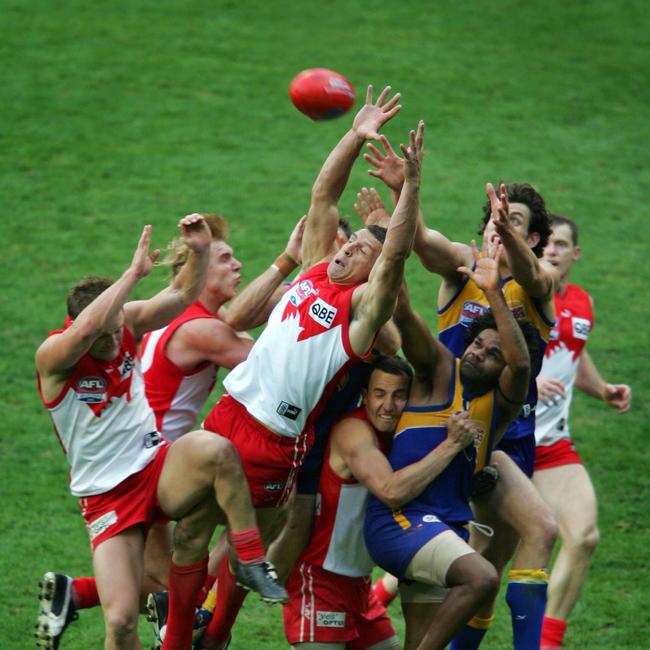
And then came Leo Barry.
Five years on from retirement, the 290-game rucking colossus knows he did exactly the right thing for exactly the wrong result in that gutting 2005 loss.
It still doesn’t make him feel much better.
“I would hate to have got stuck with the ball,” he reflects on one of footy’s most famous moments.
“I knew there wasn’t long left and in the moment I took the mark and wheeled as quickly as I could. And I got it in as deep as I could, hoping if no one took the mark we could crumb a goal or get a score. We had Samps (Ash Sampi) and Seabs (Mark Seaby) who could take a contested mark and Chris Judd who never took one….
“But it just didn’t eventuate. Leo took his mark and the rest is history.”
A decade and a half later he hasn’t watched that replay, unaware if he missed a teammate standing free in the corridor.
“I am kind of hoping there wasn’t, but at that time of the game the chance to square something close is a turnover opportunity so I was just trying to get it back in there.
“The game went so quickly and we were ready for it but you go from one of the best experiences of your life to one of the worst. That was how heart-wrenching it was.”
Thankfully for Cox this was not a cruel punchline to a career unrequited.
Just over 12 months later the final siren would deliver a different result in a familiar part of the MCG.
A week after a 27-disposal preliminary final performance, Cox’s 20-touch, 34-hitout game would finish with the ball literally in his hands as he jostled with Sydney’s Stephen Doyle.
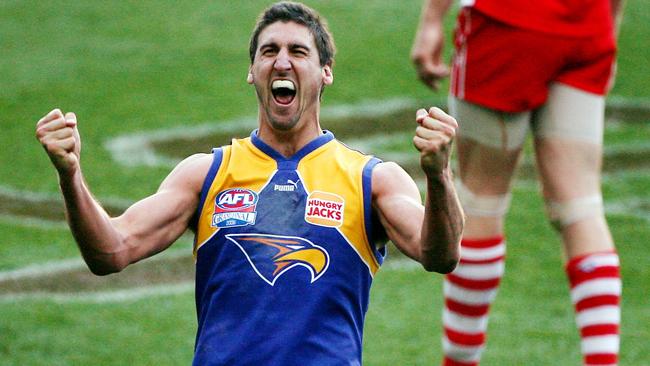
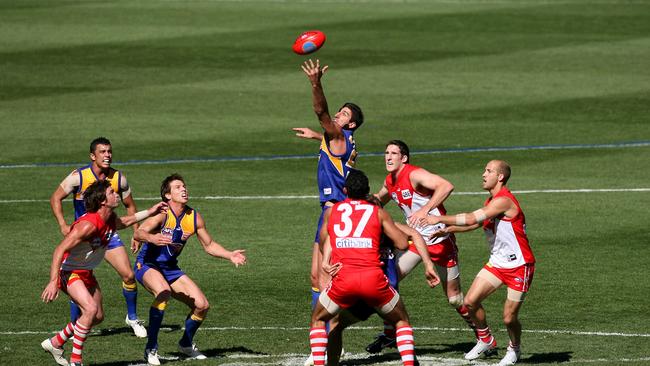
“It was just unbelievable. For all the battles we had with Sydney, to finish in the same spot on the ground for a second year in a row, but with a completely different feeling…
“The excitement, the raw emotion but also the relief that we finally got it done.
“That was the thing that stuck out in my mind is that the hard work has paid off and we have reached the pinnacle of football.”
Amid all the debates about footy’s 21st century stars there is one contest over before it begins.
Dean Cox, a kid from the Dampier Sharks who could beat home only Scott Cummings in his first Eagles training session, is the greatest ruckman of the modern era.
He took all the individual skills that made up the game’s rucking idols and combined them in a career that became a prototype for the players who would come after him.
Cox is proud to have changed the game, even if his humility won’t allow him to label it in that manner.
“It’s a huge honour,” he says of that tag of the game’s best modern-day ruckman.
“I tried to make my family proud and playing for West Coast was a dream. Being recognised that way is a huge honour and I suppose now seeing some of the players performing a similar skillset is really rewarding.”
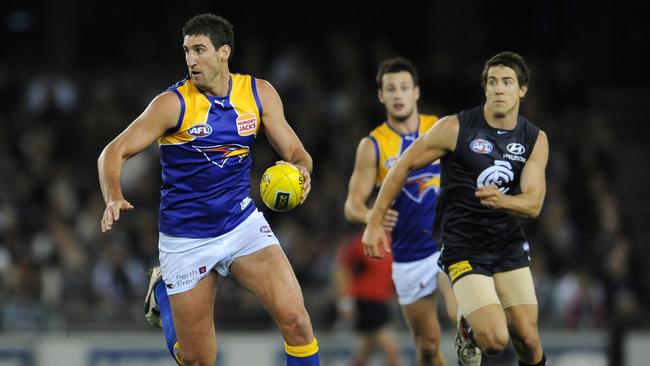
A career that in hindsight seemed destined to change the way ruckmen play the game had repeated flashpoints that could have diverted him from his path.
As a kid growing up playing as a ruckman for the Dampier Sharks, the natural sportsman grew up around relatives including his mother Mary’s brothers, who hammered into him the need to use both sides of his body.
Yet when handed a chance to train with West Coast as an East Perth Colts player, the lessons of that rude introduction never left him.
“I found out Friday I was training Monday and I had no idea about an off-season program. We had a skills session for an hour then they said put your joggers on, we have a 3km time trial.
“Then we rocked straight into another one. Halfway through I thought, shit, I am actually not sure this is for me. So you sink or swim.”
Cummings was the only rival he beat home, and when rookie-listed by West Coast there were times he was physically sick at the thought of those time trials ahead.
Yet soon he was running on his off days and attempting to replicate the athletic feats of footy’s hardest-running side.
One day assistant Tony Micale took him to a Carlton-Fremantle game where he sat with a notepad and charted Carlton’s Matthew Allen as he journeyed around Subiaco Oval.
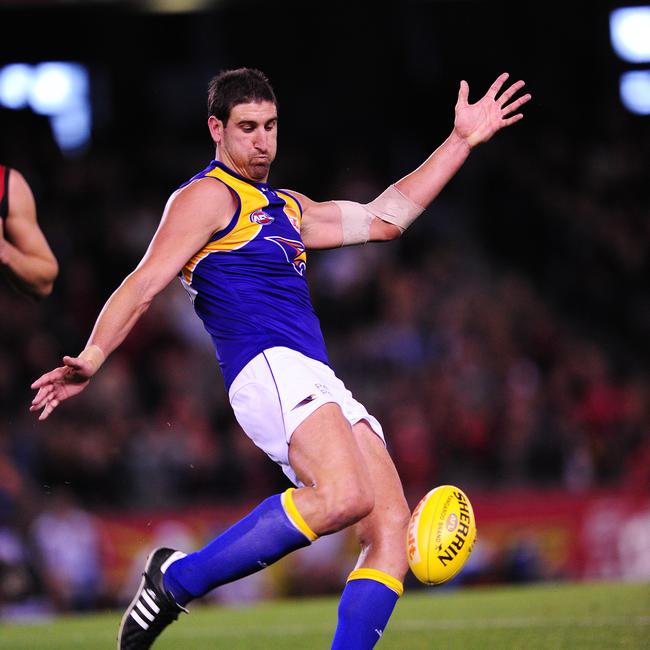
“Ruckmen were starting to generate the ball around the ground. Steven King, Luke Darcy, Matthew Allen, they became link players. It wasn’t stoppage to stoppage, and that guided me to try to have that same impact,” says Cox.
Eventually they were attempting to replicate his deeds.
But before that the club’s star ruckman Michael Gardiner stood in his path, first motivating Cox to improve, then eventually frustrating him given the lack of opportunities.
Ask him to identify THE moment his career changed if his life was a sports movie melodrama and Cox says it is the period when Gardiner’s injuries allowed him to flourish.
From his 2001 debut he had played 17, 19 and 19 games but after considering overtures from St Kilda to be their No.1 ruckman, suddenly that path beckoned at West Coast.
“I think my career would be different if Michael Gardiner didn’t get injured. That’s probably the turning point of my career. Would it have been at West Coast? Or would I have rucked solely for the majority of my career? He was the best big man going around at that stage and there had been preliminary talks (with St Kilda). I didn’t want to leave and barracked for West Coast as a club. But you would be playing 40 or 50 minutes off the bench and in 2003 Michael was an All Australian ruckman and then he hurt himself in Round 3, 2004 and had surgery and I had a little bit of belief I could hold that position.”
A team that had stars including Ben Cousins, Daniel Kerr and Chad Fletcher added Chris Judd in the 2001 draft and rounded it out with the rugged Daniel Chick and defensive midfielder Tyson Stenglein.
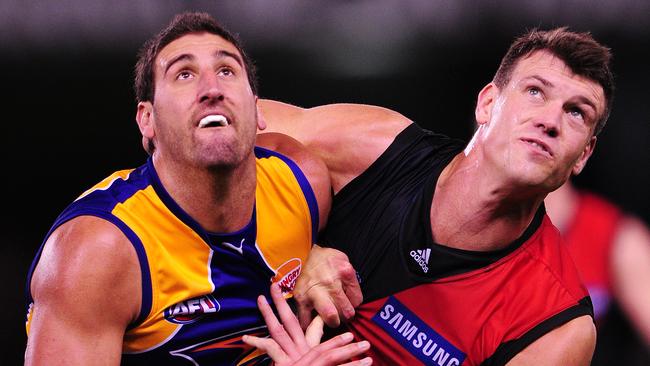
“We played finals in 2003-2004 but lost the first final each time and the way we lost to Sydney in 2004 took a dent and from that belief came. We were a really confident group and we knew what we had. We had some serious running power spread out across the field. So as the big games unfolded, we had some big comeback wins and you build that belief until the Grand Final comes.”
In 2005 he was a defensive colossus in the qualifying final taking two match-saving marks in the final moments, and by 2006 he was a premiership player.
Yet as he admits in his biography Iron Eagle the club’s drug issues had spiralled out of control by the summer of 2006-7, with players who confirmed to John Worsfold his suspicions about drug use in double figures.
He believes he could have done more to help rein in that culture, with the club spending what should have been the peak of Cox’s career rebuilding its reputation through countless meetings and seminars.
In effect, they sacrificed performance to save a club’s reputation.
“If you look back now it’s fitting that over the games we played (against Sydney) we both got one flag, but the thing that eats at me is we couldn’t hold our team together for long enough to challenge for more. We had a team that could. You talk about 2007 but we finished third, played Port Adelaide away and Cuzzy tears his hamstring, Juddy has his groins (osteitis pubis) and Kerr damages a tendon in his finger and we go home and lost to Collingwood in extra time with none of them playing.
“We know what happened after that, but if we had held them a bit longer?
“I look back on it now and the amount of time we spent in meetings with external consultants was dramatic. You spend those hours doing that and not honing parts of our game, but it had to be done. The footy club certainly had those three leaner years and a poor one in 2010 but played in the prelim in 2011 and the second semi in 2011 and what they did in 2015 and 2018 was all part of that.”
MORE AFL NEWS:
Fremantle forward Cam McCarthy released from hospital after training collapse
Brisbane champion Jonathan Brown has been inducted into the Australian football Hall of Fame
Brisbane great Simon Black has been inducted into the Australian football Hall of Fame
Originally published as West Coast great Dean Cox has been inducted into the Australian football Hall of Fame


